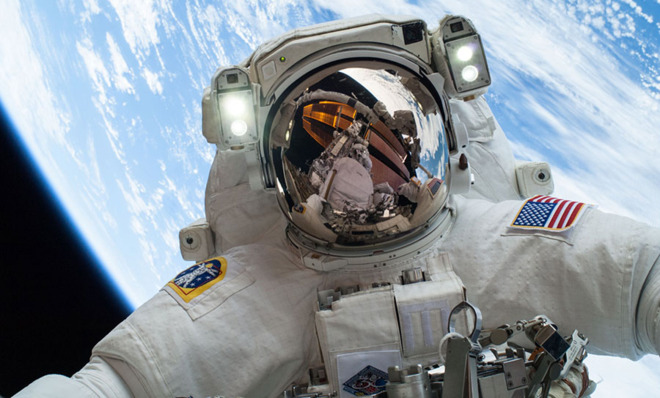Why Christians should get on board with space exploration
New data analysis shows that some Christians are pessimistic about space exploration. But believers have good reason to change their minds.


When a European spacecraft executed the first successful landing on a comet last week, much of the world celebrated. But many Christians yawned.
Christians are less interested in space and less supportive of exploring it than the general population, according to a paper presented by University of Dayton professor Joshua Ambrosius at this year's gathering of the Society for the Scientific Study of Religion. Drawing data from the General Social Survey and three Pew studies comparing attitudes among various religious traditions, Ambrosius found that church attendance actually decreases a person's support for space exploration. (Among Christians, Roman Catholics were most open and evangelical Protestants were most resistant.)
But Christians have no cause for resisting space exploration. Here are three bad reasons why Christians oppose space exploration — and one good reason they should get on board.
The Week
Escape your echo chamber. Get the facts behind the news, plus analysis from multiple perspectives.

Sign up for The Week's Free Newsletters
From our morning news briefing to a weekly Good News Newsletter, get the best of The Week delivered directly to your inbox.
From our morning news briefing to a weekly Good News Newsletter, get the best of The Week delivered directly to your inbox.
1. A knee-jerk reaction to science
One impetus for Christian resistance is that many believers see science as antagonistic toward religion.
"Space policy is a segment of science policy, and certain segments of Christianity — most notably evangelical Protestants — are apprehensive when it comes to science," Ambrosius told me. "This includes evolution and climate change and can extend into space policy."
Unsurprisingly, those who believe in evolution are more likely to also believe that space exploration is good for society. But don't draw too broad of a conclusion from that association.
A free daily email with the biggest news stories of the day – and the best features from TheWeek.com
Knee-jerk disdain for scientific conclusions is rooted in a uniquely American mindset that has been shaped by historical events such as the Scopes trial and rise of the Religious Right. Believers in other parts of the world and even in other Western countries are often far less skeptical of science.
It's notable that Christian resistance to science is applied inconsistently. Apprehensions don't carry over into the oncologist's office or when purchasing multi-vitamins. Christians don't have any special opposition to pharmaceutical development or deep-sea exploration. Instead, these attitudes concentrate around politically contentious issues.
2. End times theology
Another factor driving Christians' resistance to space exploration is that some believe the apocalypse will occur before humans will make significant progress in outer space.
"Many in the Christian religious tradition — specifically evangelicals — are confident that Jesus will return within the next 40 years. And they are more confident in the second coming than they are that strides will be made in space over the next four decades," Ambrosius says. "End times theology seems to influence whether one supports long-term investments in space."
If Jesus is going to return to earth soon, these Christians conclude, we're better off diverting the billions of dollars spent on space exploration to address humans' more immediate needs.
Such believers might benefit from some Bible reading. The New Testament actually asserts that apocalyptic predictions are useless. It records that Jesus — yes, the very person Christians believe will return to earth — taught that no one (including Jesus himself) knows when the end will come.
3. The impossibility of extraterrestrial life
The final motivator behind religious resistance to space exploration concerns many Christians' skepticism about extraterrestrial life. During the Cold War, space policy was considered to be a wing of national defense policy. But by the 21st century, the possibility of discovering alien life became "a main driver" for space exploration.
Ambrosius says that regular church attendance correlates with the belief that life does not exist elsewhere in the universe. While Roman Catholics are quite open to the prospect of alien life, Protestants are less so — and many evangelicals reject even the possibility.
David Weintraub, professor of physics at Vanderbilt University and author of Religions and Extraterrestrial Life, has also studied the intersection between religion and attitudes about aliens. He says that "most evangelical and fundamentalist Christian leaders argue quite forcefully that the Bible makes clear that extraterrestrial life does not exist. From this perspective, the only living, God-worshipping beings in the entire universe are humans, created by God, who live on Earth."
Consider Ken Ham, a popular evangelical creationist who argues that the search for aliens is driven by humanity's "rebellion against God" and secularists' desire to prove evolution.
Ham wrote in a recent blog post, "I'm shocked at the countless hundreds of millions of dollars that have been spent over the years in the desperate and fruitless search for extraterrestrial life . . . . Christians certainly shouldn't expect alien life to be cropping up across the universe."
While the Bible itself is silent on the matter of extraterrestrials, the matter is largely irrelevant. Many other good reasons for Christians to support space exploration exist.
Why Christians should support NASA
NASA technology has contributed to myriad inventions that have improved human existence, such as CAT scans, home water filters, aviation safety systems for pilots, and LASIK surgery. NASA satellites help us monitor weather formations, empowering farmers to harvest crops more effectively and government officials to evacuate communities before a hurricane hits. Exploring the universe has improved life on earth and aligns with Christians' historic pursuit of the common good.
But perhaps more significantly, space exploration can shift our gaze from the temporal to the transcendent. Images of Earth against a shadowy backdrop imbue one with near-spiritual awe. Even landing on a comet can echo the sentiments of C.S. Lewis penned in the second book his space trilogy: "Be confident small immortals. You are not the only voice that all things utter, nor is there eternal silence in the places where you cannot come."
Jonathan Merritt is author of the book Learning to Speak God from Scratch: Why Sacred Words are Vanishing — and How We Can Revive Them and a contributing writer for The Atlantic.
-
 A running list of everything Trump has named or renamed after himself
A running list of everything Trump has named or renamed after himselfIn Depth The Kennedy Center is the latest thing to be slapped with Trump’s name
-
 Do oil companies really want to invest in Venezuela?
Do oil companies really want to invest in Venezuela?Today’s Big Question Trump claims control over crude reserves, but challenges loom
-
 ‘Despite the social benefits of venting, people can easily overdo it’
‘Despite the social benefits of venting, people can easily overdo it’Instant Opinion Opinion, comment and editorials of the day
